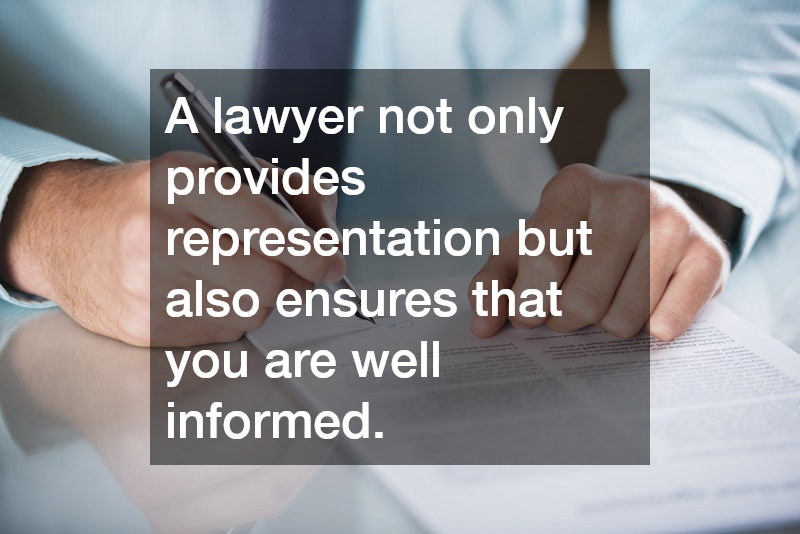Disclaimer: Concordia Research. This site provides general content for informational purposes only.
In an ever-complex legal environment, understanding when to seek professional legal assistance is crucial. A lawyer not only provides representation but also ensures that you are well informed on matters that can significantly affect your life’s course. This article explores common scenarios where obtaining a lawyer’s guidance is imperative.
Family and Divorce Matters
Family and divorce matters can be emotionally challenging and legally complicated, requiring expert guidance. When navigating a divorce, a lawyer can help you understand the division of assets, custody arrangements, and spousal support.
It’s crucial to have a legal professional to advocate for your interests and safeguard your rights during such a tumultuous time.
Moreover, lawyers play an essential role in resolving custody disputes. They help in negotiating and drafting parenting plans that prioritize the child’s welfare while considering both parents’ rights. A lawyer’s expertise is invaluable in ensuring that the parenting agreement complies with legal standards and is enforceable.
For issues like adoption, having a lawyer can streamline the process efficiently. They ensure that all legal requirements are met, avoiding unnecessary delays and complications. Engaging a lawyer helps to mitigate potential legal risks and ensures a smoother transition into a new family structure.
Business and Contractual Disputes
Business and contractual disputes are inherently complex and often require a specialized lawyer to navigate successfully. Whether you’re establishing a business, entering into contracts, or facing litigation, a lawyer can provide the expertise to manage these challenges effectively. Their knowledge can prevent potential legal issues from escalating, which in turn can save your business significant resources.
A lawyer is instrumental in drafting, reviewing, and negotiating contracts to ensure they protect your interests. They help identify and mitigate potential risks by addressing ambiguities in the contract terms. Having a lawyer involved in these processes can fortify your business relationships and reduce the likelihood of disputes.
Litigation, whether anticipated or initiated, demands a strategic legal approach. A lawyer will represent your interests in court, aiming for resolution through negotiation or a favorable judgment. Their understanding of court procedures and precedence sets the groundwork for your case, making their expertise invaluable in contentious business scenarios.
Criminal Charges
Facing criminal charges is perhaps one of the scariest situations where legal assistance is essential. A lawyer specializes in dealing with the complexities of the criminal justice system and can guide you through the entire process. They safeguard your rights while devising a strategy to achieve the best possible outcome.
It’s crucial to seek a lawyer who can navigate state-specific laws and statutory procedures. An experienced lawyer will analyze the evidence against you, challenge its admissibility, and work toward minimizing potential penalties. Their expertise is vital in building a defense, negotiating leniency, or pursuing alternative resolutions.
Legal representation is equally necessary when plea bargaining is an option. A lawyer can help you understand the implications of pleading guilty versus going to trial, making negotiations with the prosecution more equitable. Their guidance ensures you are making informed decisions that align with your legal rights and long-term interests.
Estate Planning and Probate
Estate planning often involves complex legal documents that benefit from a lawyer’s counsel. Whether drafting a will, establishing a trust, or planning for tax implications, a lawyer ensures your wishes are clearly articulated and legally sound. Their involvement can minimize potential disputes among beneficiaries and maximize your estate’s value.
During probate, a lawyer’s assistance becomes crucial in administering a deceased person’s estate. They navigate the intricate procedures involved, which can differ significantly depending on state laws. A lawyer’s guidance facilitates a smoother probate process, ensuring that assets are distributed in accordance with the law and the decedent’s wishes.
Furthermore, in cases where disputes arise between heirs or executors, a lawyer is vital in mediating the conflicts. They provide a balanced viewpoint and advise on the legal ramifications of different actions, helping to reach amicable solutions. Lawyers safeguard the interests of all parties involved, avoiding prolonged litigation and fostering cooperative resolution.
.




